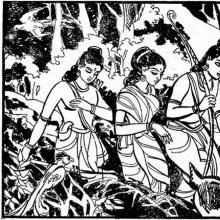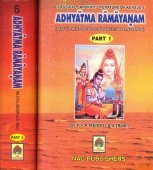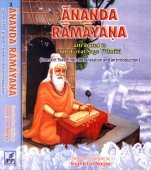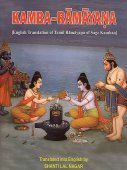Viradha, Virādha: 15 definitions
Introduction:
Viradha means something in Hinduism, Sanskrit, Jainism, Prakrit. If you want to know the exact meaning, history, etymology or English translation of this term then check out the descriptions on this page. Add your comment or reference to a book if you want to contribute to this summary article.
Images (photo gallery)
In Hinduism
Purana and Itihasa (epic history)
Source: Wisdom Library: Skanda-puranaVirādha (विराध) is the name of a gaṇa (attendant of Śiva), mentioned in the Skandapurāṇa 4.2.53. In this chapter, Śiva (Giriśa) summons his attendants (gaṇas) and ask them to venture towards the city Vārāṇasī (Kāśī) in order to find out what the yoginīs, the sun-god, Vidhi (Brahmā) were doing there.
While the gaṇas such as Virādha were staying at Kāśī, they were desirous but unable of finding a weakness in king Divodaśa who was ruling there. Kāśī is described as a fascinating place beyond the range of Giriśa’s vision, and as a place where yoginīs become ayoginīs, after having come in contact with it. Kāśī is described as having both the power to destroy great delusion, as well as creating it.
The Skandapurāṇa narrates the details and legends surrounding numerous holy pilgrimages (tīrtha-māhātmya) throughout India. It is the largest Mahāpurāṇa composed of over 81,000 metrical verses, with the core text dating from the before the 4th-century CE.
Source: archive.org: Puranic EncyclopediaVirādha (विराध).—A fierce Rākṣasa (giant) whom Rāma and Lakṣmaṇa killed in the Daṇḍaka forest. Virādha was the rebirth of Tumburu, a Gandharva who had been cursed to become a Rākṣasa. The story about Śrī Rāma’s liberating the Gandharva from the curse and sending him back to the world of Gandharvas, occurs in Vālmīki Rāmāyaṇa, Araṇya Kāṇḍa, Sargas 2 to 4, as follows.
In days of old, Tumburu, a Gandharva had been serving Kubera. Once Tumburu was asked by Kubera to bring Rambhā. Tumburu failed in bringing Rambhā at the stipulated time. Kubera got angry and cursed Tumburu to become a Rākṣasa. Tumburu requested for liberation from the curse. Kubera granted his request and said "In Tretāyuga, Mahāviṣṇu will incarnate as Śrī Rāma, who with his sword will change your Rākṣasa form. You will regain your former form and will come back to the world of Gandharvas." (See full article at Story of Virādha from the Puranic encyclopaedia by Vettam Mani)
Source: Cologne Digital Sanskrit Dictionaries: The Purana IndexVirādha (विराध).—A Rākṣasa of the Vitalam.*
- * Vāyu-purāṇa 50. 28.
Virādha (विराध) was a gandharva, a demi god named Tuṃburu. Owing to a curse he became a demon (yakṣa). Virādha, in the form of a demon, meets Rāma who cuts off his arms. As soon as he becomes armless he assumes his original form of the Yakṣa Tuṃburu and prostrates at the feet of Sītā to beg her pardon.

The Purana (पुराण, purāṇas) refers to Sanskrit literature preserving ancient India’s vast cultural history, including historical legends, religious ceremonies, various arts and sciences. The eighteen mahapuranas total over 400,000 shlokas (metrical couplets) and date to at least several centuries BCE.
General definition (in Hinduism)
Source: WikiPedia: HinduismVirādha (विराध): A fierce rakshasa who seizes Sita.
In Jainism
General definition (in Jainism)
Source: archive.org: Trisastisalakapurusacaritra1) Virādha (विराध) is the name of a lion, according to the Jain Ramayana and chapter 7.2 [Rāvaṇa’s expedition of conquest] of Hemacandra’s 11th century Triṣaṣṭiśalākāpuruṣacaritra: an ancient Sanskrit epic poem narrating the history and legends of sixty-three illustrious persons in Jainism.—Accordingly, “Candrodara, who had been expelled by Khara at that time, died in course of time. His wife, Anurādhā, who was with child, escaped into a forest. In the forest she bore a son, like a lioness bearing a lion, powerful, named Virādha, the vessel of virtues, prudent conduct, etc. Grown up, a traveler across the ocean of all the arts, he wandered over the earth with unstumbling progress, long-armed. [...]”.
2) Virādha (विराध) is the son of king Candrodara from Pātālalaṅkā, according to chapter 7.6 [Bringing news of Sītā].—Accordingly, “Then Virādha, son of King Candrodara, lord of Pātālalaṅkā, came there with an army all equipped. Wishing to propitiate Rāma’s brother, Virādha said: ‘I am your soldier, hostile to these enemies of yours. O powerful one, after expelling my father, Candrodara, these soldiers of Rāvaṇa seized Pātālalaṅkā. [...]’.”.

Jainism is an Indian religion of Dharma whose doctrine revolves around harmlessness (ahimsa) towards every living being. The two major branches (Digambara and Svetambara) of Jainism stimulate self-control (or, shramana, ‘self-reliance’) and spiritual development through a path of peace for the soul to progess to the ultimate goal.
Languages of India and abroad
Sanskrit dictionary
Source: DDSA: The practical Sanskrit-English dictionaryVirādha (विराध).—
1) Opposition.
2) Annoyance, vexation, molestation.
3) Name of a powerful Rākṣasa slain by Rāma.
Derivable forms: virādhaḥ (विराधः).
Source: Cologne Digital Sanskrit Dictionaries: Shabda-Sagara Sanskrit-English DictionaryVirādha (विराध).—m.
(-dhaḥ) 1. Opposition, prevention. 2. Vexation, annoyance. E. vi before rādh to accomplish, ghañ aff.
Source: Cologne Digital Sanskrit Dictionaries: Benfey Sanskrit-English DictionaryVirādha (विराध).—[vi-rādh + a], m. 1. Prevention, opposition. 2. Vexation. 3. A Rākṣasa, [Uttara Rāmacarita, 2. ed. Calc., 1862.] 15, 19.
Source: Cologne Digital Sanskrit Dictionaries: Cappeller Sanskrit-English DictionaryVirādha (विराध).—[masculine] [Name] of a Rākṣasa.
Source: Cologne Digital Sanskrit Dictionaries: Monier-Williams Sanskrit-English Dictionary1) Virādha (विराध):—[=vi-rādha] [from vi-rādh] m. thwarting, opposition, vexation, [Horace H. Wilson]
2) [v.s. ...] Name of a Rākṣasa, [Harivaṃśa; Rāmāyaṇa] etc.
3) [v.s. ...] of a Dānava, [Harivaṃśa]
Source: Cologne Digital Sanskrit Dictionaries: Yates Sanskrit-English DictionaryVirādha (विराध):—[vi-rādha] (dhaḥ) 1. m. Vexation; opposition.
Source: DDSA: Paia-sadda-mahannavo; a comprehensive Prakrit Hindi dictionary (S)Virādha (विराध) in the Sanskrit language is related to the Prakrit word: Virāha.
[Sanskrit to German]
Sanskrit, also spelled संस्कृतम् (saṃskṛtam), is an ancient language of India commonly seen as the grandmother of the Indo-European language family (even English!). Closely allied with Prakrit and Pali, Sanskrit is more exhaustive in both grammar and terms and has the most extensive collection of literature in the world, greatly surpassing its sister-languages Greek and Latin.
Kannada-English dictionary
Source: Alar: Kannada-English corpusVirādha (ವಿರಾಧ):—
1) [noun] the act of opposing; opposition; thwarting.
2) [noun] a vexing or being vexed; vexation.
Kannada is a Dravidian language (as opposed to the Indo-European language family) mainly spoken in the southwestern region of India.
See also (Relevant definitions)
Starts with (+1): Viradhagupta, Viradhahan, Viradhaka, Viradhalem, Viradhana, Viradhanva, Viradhanvan, Viradhara, Viradharma, Viradhaya, Viratai, Viratam, Viratamirakku, Viratampiti, Viratanan, Virataniyamam, Viratanka, Viratantai, Virataran, Virataru.
Full-text: Viradhana, Viradhahan, Shatahrada, Viradhagupta, Viradhaya, Viradhya, Viradh, Viraha, Tumburu, Sunda, Virageti, Devopagitanagara, Devopagita, Bhuvanajit, Gaja, Anuradha, Jaya.
Relevant text
Search found 13 books and stories containing Viradha, Vi-radha, Vi-rādha, Virādha, Virāḍha; (plurals include: Viradhas, radhas, rādhas, Virādhas, Virāḍhas). You can also click to the full overview containing English textual excerpts. Below are direct links for the most relevant articles:
Ramayana of Valmiki (by Hari Prasad Shastri)
Chapter 3 - The Struggle between Viradha and the two Brothers < [Book 3 - Aranya-kanda]
Chapter 2 - The Demon Viradha carries off Sita < [Book 3 - Aranya-kanda]
Chapter 4 - Rama and Lakshmana slay the Demon Viradha < [Book 3 - Aranya-kanda]
Puranic encyclopaedia (by Vettam Mani)
Trishashti Shalaka Purusha Caritra (by Helen M. Johnson)
Part 1: Restoration of Pātālalaṅkā to Virādha < [Chapter VI - Bringing news of Sītā]
Part 2: Sāhasagati as a false Sugrīva < [Chapter VI - Bringing news of Sītā]
Part 3: Meeting of Rāma and his sons < [Chapter IX - Sītā’s purification and taking of the vow]
The Shiva Purana (by J. L. Shastri)
Chapter 20 - The greatness of the Jyotirliṅga Bhīmeśvara < [Section 4 - Koṭirudra-Saṃhitā]
Ramayana (by Manmatha Nath Dutt)
The Brihaddharma Purana (abridged) (by Syama Charan Banerji)
Related products



